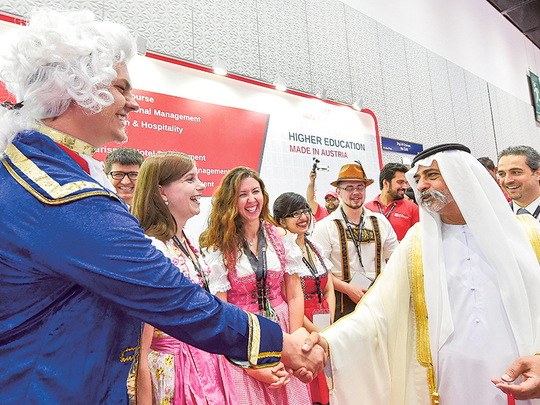
Dubai: Emerging markets for education are making their presence felt at the 28th edition of the Gulf Education and Training Exhibition (Getex) as it opened its doors to students today.
The three-day event, which concludes on Friday, was inaugurated by Shaikh Nahyan Bin Mubarak Al Nahyan, Minister of Culture and Knowledge Development, and aims to bring the latest programmes universities have to offer under one roof for students and parents.
As the educational infrastructure and scope in the UAE gains momentum and its excellent array of options are represented at the event, Getex also serves to present students with options for overseas educational opportunities.
Representatives from educational institutions in emerging markets attending the event said that several important factors have played a role in attracting students from the UAE and around the world to these countries.
Countries like Italy, Indonesia, Poland, and Cyprus, to name a few, are attracting students with study opportunties tied to affordability and credibility of programmes that are internationally accredited.
From Indonesia, Ahmad Jamile, associate professor from the Faculty of Economics and Business Universitas Gadjah Mada in Yogyakarta, said the “student cultural city” has been attracting many foreign students to programmes in medical science, economics, business and social sciences, natural science and geology.
“Studying in Indonesia is relatively cheaper, compared to traditional markets for education,” said Jamile. “Many students are coming from Europe, UK, Japan, and China because they are able to get the quality education they are looking for while also enjoying the cultural diversity in the country.”
Jamile said Indonesia’s natural beauty is also a draw for many students. “It is a maritime country, that’s what we call it.”
However, he said, the country is not yet popular with Emiratis and the university’s representation at Getex, he said, hopes to overcome that challenge. “Students from the Gulf are still not familiar with what Indonesia has to offer, so we are trying to get some exposure through the exhibition.”
Echoing similar reasons for Hungary was Jolly Soosan Thomas, managing director of Eduscope, representing the University of Debrecen. She said the country is emerging as a popular study option because most courses are available and the tuition fees are cheaper as compared to traditional top markets like US, UK and Canada.
“Around 50 students are sent [by Eduscope] to Hungary every year and they comprise mostly Arab expatriates, Indians and Asians. Almost 90 per cent of them want to go Hungary for a degree in medicine.”
She said that the tuition fees are “almost one-third of the tuition fees in other top markets without a compromise on quality in education.” And it is not too far from the UAE, she added.
According to Thomas, many students often also weigh the other advantages of studying medicine in Hungary. “In the US, the study programme for medicine is eight years — four years of basic science and four years of clinical science. After the four years of basic course, there’s an examination that determines if a student can continue for the next four years. If they fail, everything is gone.”
In Hungary, the system is different, she said, “Once they finish [the medical course], they come out as doctors provided they complete six years of study. During this period, they can also get their licence to work at the same time.”
Hungary, she said, is politically stable with little to no challenges for students in the area of transportaion and mobility as the country has an excellent train network and private transportation.
Agnes Tsai, representing the Medical University of Lubin in Poland for the first time, said her mission was to attract students from the UAE to go for a dual medical degree programme offered in both Poland and China.
“Both countries are offering recognised quality of education in medicine. Through our programme, students get a chance to experience both European and Chinese cultures.”
Poland, she explained, has lower tuition fees for medicine as opposed to other countries and is also becoming known for its medical programmes. “The cost of living is affordable. Many Asian students in the UAE are interested in studying there.”












